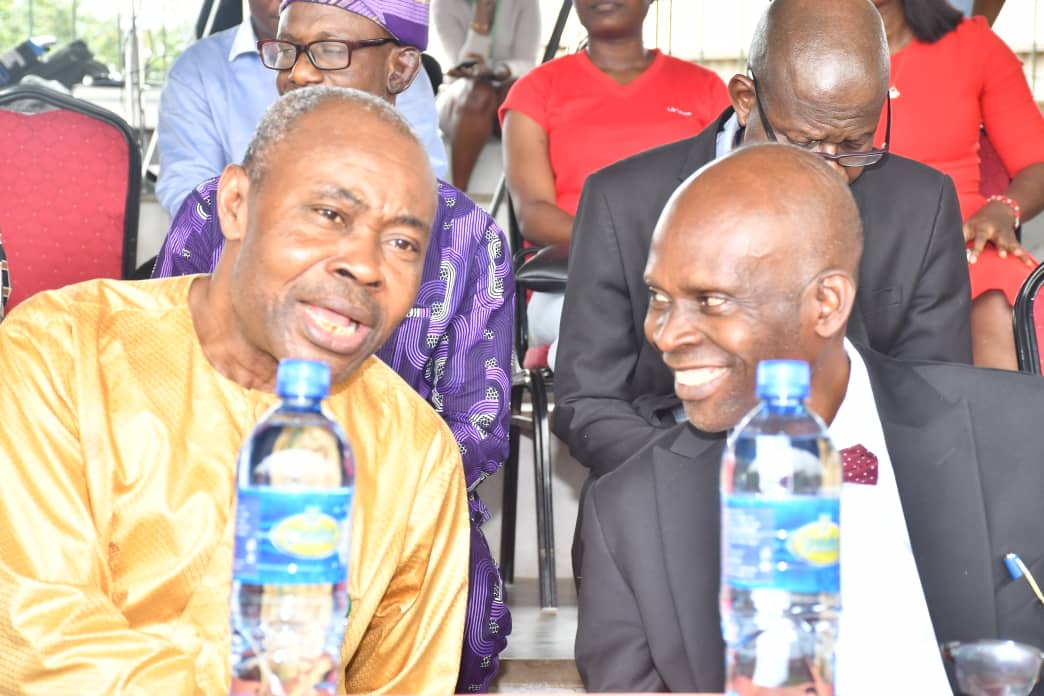
(l-r) Mr. Uduak Iyang-Udo, Yabatech Deputy Rector, Administration, representing the institution, Dr. Engr. Ibraheem Abdul and Dr. Abubakar Olaseni, the Key Note Speaker and former Deputy Rector, Academic of the College at the Citadel’s World Teachers Day
A vision of fair teaching and learning that enables pupils to succeed in a constantly changing world has been characterised as having globally competent instructors.
This claim was made by Dr. Abubakar Olaseni, a former deputy rector and academic at Yaba College of Technology, in a keynote address during the World Teachers Day celebration that Yabatech and UNESCO organised for the college and its neighbourhood.
A globally competent teacher must adopt a mindset that converts personal global competence into professional classroom practise, according to Olaseni’s study, The Teacher We Need for the Education We Want: The Global Imperative to Reverse the Teacher Shortage.
Teachers, he said, should act as guides for their students and direct them in their individual processes of development, taking into consideration the challenges of the globalisation process.
The former deputy rector identified five characteristics and skills of the global teachers as creating a classroom environment that values diversity; integrating global learning experiences into the curriculum; facilitating intercultural conversations and partnerships; and assessing students’ global competence development.
According to Olaseni, “with shifting educational landscape, the traditional model of education is no longer sufficient to prepare students for challenges of the 21st century.
The teacher we need must adapt to an evolving educational landscape, which includes technology integration, diverse classrooms, and a focus on skills over note memorization”.
The Rector, Yaba College of Technology (YABATECH) Dr. Engr. Ibraheem Abdul, in his address as the chief host, declared that every October five (5) has been set aside to celebrate the commitment, untiring efforts of teachers globally and to thank them for their sacrifices and resilience even in the face of daunting challenges.
Engr. Abdul who was ably represented by Deputy Rector Administration, Mr. Uduak Iyang Udoh at the 2023 World Teacher’s Day celebration explained that, it is imperative to appreciate Teachers and to reassure them that we believe in their ability to save the future of education in the country.
He disclosed that it is a thing of concerned in the education sector because of the massive exodus from the teaching profession to others areas that offer more lucrative and irresistible opportunities.
According to him “This occupational mobility, which has been fueled by socio-economic uncertainties and the quest for sustainable livelihood, has left a yearning gap in the educational space.
This gap is what these global bodies are asking all countries to proactively address”, “The place of qualified teachers and a conducive learning environment are critical to this global clarion call.
The teachers we need should be the best hands in the land, not those who see teaching as a means to an end.
He added that the teachers we needed are those who have burning passion for the classroom, not those who desecrate the sanctuary of learning.; those who are called and are prepared for the challenges of building a future for the teaching profession, not those who are ashamed to bear the self-effacing emblem of the noble profession.
An aggregate of these noble and unassuming qualities in the teachers we need will certainly lay a solid foundation for the type of education we want for our children and the future generation,” Abdul averred.
The Coordinator of the Yabatech UNESCO-UNEVOC Programe, Dr. (Mrs.) Franca Agamah opined that teachers are faced with several challenges across different educational settings and institutions; varied learning needs, balancing teaching responsibilities with research expectations, administrative responsibilities, large classes and limited resources.
According to her ” We can learn successful strategies through collaboration, sharing our own experiences to develop effective solutions.”
Harnessing best practices, technology through online platforms, digital resources, and blended learning approaches can help bridge the gaps; she claimed.
Toward sustaining the profession, there is need for investment and reinvestment in education facilities, and resources, training and capacity development to equip educators with the skills and knowledge required to meet needs of current realities and emerging challenges; Dr. Agama submitted.
She admonished the teachers recommit themselves to the cause of education and recognize that, indeed, the teacher we need is instrumental in shaping the education we want.